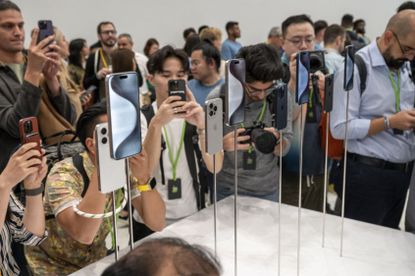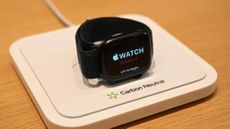China steals the spotlight at Apple's iPhone 15 launch
How will a directive from the Chinese government affect the tech giant?

The smartest insight and analysis, from all perspectives, rounded up from around the web:
A crisis in China is not what Apple needed on the eve of its latest iPhone launch, said Mark Gurman in Bloomberg. As company leaders prepared to unveil the iPhone 15, Beijing last week began ordering government employees to stop using Apple products altogether, at work or at home, citing cybersecurity concerns. The Chinese government is considering extending the ban across state-owned enterprises as well. “The news erased $190 billion from Apple’s valuation” as investors sized up the potential hit to Apple’s revenue. “The company generates about a fifth of its sales from China, which is also the heart of Apple’s supply chain.” But “anti-Apple sentiment has spread on Chinese social media” in recent weeks as geopolitical tensions intensify. “The iPhone 15 line, with niceties like a titanium frame and enhanced camera, is meant to help pull the company out” of a recent funk. But Apple will need China to pull that off.
This is a many-billion-dollar headache, said Dan Gallagher in The Wall Street Journal. If China indeed extends the iPhone ban to encompass “state-owned enterprises,” that’s about 56 million workers, according to China’s National Bureau of Statistics. Even with 230 million iPhone sales globally each year, losing “56 million would be a notable chunk to take out of the pool of potential buyers.” The direct hit to Apple’s sales from this government directive isn’t the primary concern, said Timothy Green in The Motley Fool. The bigger worry is that the ban could “reverberate” and make other consumers in China shift “away from Apple’s products as well, either because of pressure or simply reading the tea leaves.”
Subscribe to The Week
Escape your echo chamber. Get the facts behind the news, plus analysis from multiple perspectives.

Sign up for The Week's Free Newsletters
From our morning news briefing to a weekly Good News Newsletter, get the best of The Week delivered directly to your inbox.
From our morning news briefing to a weekly Good News Newsletter, get the best of The Week delivered directly to your inbox.
Sales may shrink in China, but they’re growing almost everywhere else, said Tripp Mickle in The New York Times. Fifteen years after unveiling the first iPhone, Apple now claims “about a fifth of the world’s smartphone sales, up from a low of 13% in 2019.” Sales have boomed in China but also in Europe, Japan and India. In the U.S., iPhones “now account for more than 50% of smartphones sold, up from 41% in 2018.” That’s partly because of Apple’s claim on the “coolness” factor prized by young consumers. “Nearly 90% of American teenagers own an iPhone,” according to investment bank Piper Sandler. And retention is unparalleled: A staggering 94% of iPhone customers are likely to buy another one.
Apple is also a victim of its own success, said Dave Lee in Bloomberg. “The quality of Apple’s engineering” has meant that users can hang on to their iPhones for longer than in the old days before needing to upgrade. Apple has recognized this and pivoted to services; it now has “more than 1 billion subscribers to its various offerings,” such as Apple TV+ and Apple Music, which have pushed up services revenue. Still, at its core, Apple remains an iPhone company. The new iPhone 15 line touts a faster chip, better camera, and narrower bezel. “Will that be enough to have people heading out in droves to upgrade? It’s a big ask.”
This article was first published in the latest issue of The Week magazine. If you want to read more like it, you can try six risk-free issues of the magazine here.

Continue reading for free
We hope you're enjoying The Week's refreshingly open-minded journalism.
Subscribed to The Week? Register your account with the same email as your subscription.
Sign up to our 10 Things You Need to Know Today newsletter
A free daily digest of the biggest news stories of the day - and the best features from our website
-
 10 things you need to know today: December 3, 2023
10 things you need to know today: December 3, 2023Daily Briefing Gaza residents flee as Israel continues bombardment, Trump tells supporters to 'guard the vote' in Democratic cities, and more
By Justin Klawans, The Week US Published
-
 5 X-plosive cartoons about Elon Musk
5 X-plosive cartoons about Elon MuskCartoons Artists take on his proposed clean-up of X, his views on advertisers, and more
By The Week US Published
-
 2023: the year of superhero fatigue
2023: the year of superhero fatigueThe Explainer The year may represent the end of an era for Hollywood
By Brendan Morrow, The Week US Published
-
 Antisemitism on X: Elon Musk goes 'thermonuclear'
Antisemitism on X: Elon Musk goes 'thermonuclear'Why everyone's talking about Social media owner takes Media Matters to court over allegations of advertising next to 'pro-nazi content'
By The Week UK Published
-
 Why Apple's carbon-neutral claims may be misleading
Why Apple's carbon-neutral claims may be misleadingSpeed Read The company isn't disclosing all the information, a new report alleges
By Devika Rao Published
-
 The advent of the AI iPhone: does new tech show promise or peril?
The advent of the AI iPhone: does new tech show promise or peril?Talking Point Apple design guru Jony Ive and OpenAI founder Sam Altman believed to be in talks to create new device
By The Week Staff Published
-
 Why is a tiny change to the iPhone's charger such a big deal?
Why is a tiny change to the iPhone's charger such a big deal?Today's Big Question A change to comply with EU regulations could have global ramifications
By Justin Klawans Published
-
 Elon Musk: the shocking degree of power wielded by an erratic billionaire
Elon Musk: the shocking degree of power wielded by an erratic billionaireTalking Point Washington has spent billions pushing for alternatives to SpaceX, but they’ve failed to deliver
By The Week Staff Published
-
 Phubbing: a marriage-wrecking habit?
Phubbing: a marriage-wrecking habit?Talking Point New study says couples are avoiding talking to each other by looking at their phones - but was it ever thus?
By The Week Staff Published
-
 Apple fixes its 'ducking' autocorrect problem
Apple fixes its 'ducking' autocorrect problemSpeed Read
By Brigid Kennedy Published
-
 Will China win the race to become the AI superpower?
Will China win the race to become the AI superpower?Today's Big Question AI has now become integral to Beijing’s system of state surveillance, repression and control
By The Week Staff Published










